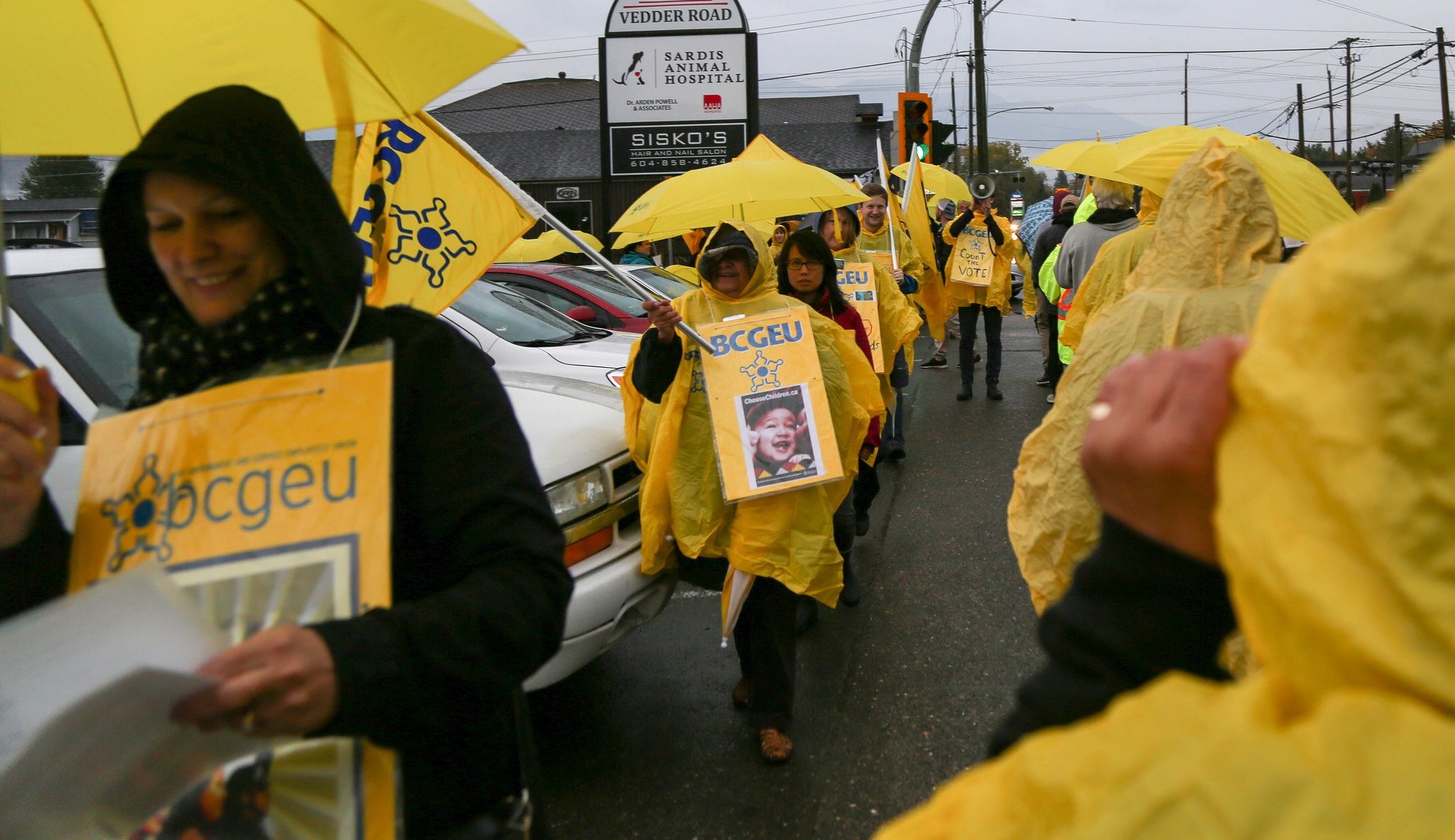Social workers rallied outside the Fraser Valley Aboriginal Child and Family Services Society Thursday in the latest step in a year-long campaign to join one of the province’s largest unions.
Some staff members, who provide a wide range of services to children and families under contract with the provincial government, reached out to the B.C. Government and Service Employees’ Union in August 2015, said union organizing representative Stephanie Ryan.
Employees voted on unionization in June, but the ballot boxes have been sealed as the union and society wrangle over whether supervisors should be included in the proposed bargaining unit. A Labour Relations Board hearing on the issue is scheduled for Thursday.
“We think this is all an unnecessary delay and unnecessary expenditure of the agency’s funds to have this legal fight and try to divide the staff,” said Ryan.
Ryan said workers were concerned about ballooning caseloads and burnout and hoped joining the union would provide better protection if they spoke up about problems, Ryan said.
The workers expressing interest in joining were not only the frontline social workers but also their supervisors or “team leads,” she said.
But the Fraser Valley agency argued that supervisors should be considered management and excluded from the union.
Executive director Samantha Langton declined to comment on the issue and directed questions back to the BCGEU.
Ryan said supervisors are included in unions in other social service agencies in the province. Other agencies with unionized supervisors, including Vancouver Aboriginal Child and Family Services Society and Metis Family Services, have shown improving working conditions for frontline staff because supervisors are in a better position to defend their teams.
“But if they are not in the union they will probably be too scared to speak out and do that advocacy work,” Ryan said.
On Thursday, staff rallied outside the agency’s Chilliwack office, one of three in the Fraser Valley. Ryan said an agreement on who would be included in the bargaining unit could have been reached months ago if the employer had sat down to negotiate the issue.
The uphill battle to join the union has left many staff fearful of losing their jobs.
One team lead said if supervisors aren’t unionized with the rest of staff, they fear that they will be fired for advocating for reduced caseloads or other changes.
“We’ll be seen as rabble rousers,” she said in a phone interview. “Since we’ve been told we’re part of management and we’re not to get involved in any union stuff, we’re going against direct orders.” The team lead agreed to speak to The Tyee on condition of anonymity, saying she feared being fired.
The team lead said workers haven’t been told why management is fighting to keep supervisors from the bargaining unit.
Team leads want to unionize to improve working conditions for themselves and their staff, she said. There are issues of underfunding, high turnover and many staff taking stress leave, she added, that affect supervisors but which they can’t fix.
She said standards suggest social workers should have no more than 25 cases, but due to understaffing “some people are carrying double that.”
The burnout and high turnover has consequences for the children and families receiving support. “For kids in care, some of them have lost their families, some of them have lost their siblings,” she said. “They’ve been in different foster homes and that [the social worker] is the only person who has been stable in their life.”
Some children have had three or four case managers over the course of a single year, she said.
Staff are forced into crisis management, she said, juggling an overwhelming number of clients and responding when there is an emergency rather than dealing with problems before they get out of control. “It puts families and kids at risk,” she said.
The society, which received $21.5 million from the provincial government last year, has been embroiled in controversy in the past.
Unless the society withdraws its complaint about the definition of staff, the labour board has until the end of November to review both sides of the case and reach a decision, the union said. ![]()
Read more: Labour + Industry
















Tyee Commenting Guidelines
Comments that violate guidelines risk being deleted, and violations may result in a temporary or permanent user ban. Maintain the spirit of good conversation to stay in the discussion.
*Please note The Tyee is not a forum for spreading misinformation about COVID-19, denying its existence or minimizing its risk to public health.
Do:
Do not: